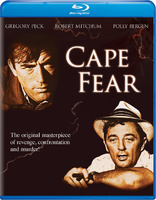Cape Fear Blu-ray Movie
HomeCape Fear Blu-ray Movie 
Universal Studios | 1962 | 106 min | Not rated | Jan 08, 2013Movie rating
7.8 | / 10 |
Blu-ray rating
| Users | 4.2 | |
| Reviewer | 4.0 | |
| Overall | 4.0 |
Overview
Cape Fear (1962)
Small-town lawyer Sam Bowden's life becomes torturous when Max Cady re-enters his life. Cady went to jail for 8 years after Bowden testified that Cady attacked a young woman. Now that Cady has been released, he begins to terrorize Bowden and his family, particularly targeting Bowden's daughter, Nancy. Initially, Cady uses his newfound knowledge of the law (learned in prison) to annoy the Bowdens, then poisons the family dog... Who's next ?
Starring: Gregory Peck, Robert Mitchum, Polly Bergen, Martin Balsam, Telly SavalasDirector: J. Lee Thompson
| Psychological thriller | Uncertain |
| Thriller | Uncertain |
| Crime | Uncertain |
| Drama | Uncertain |
Specifications
Video
Video codec: VC-1
Video resolution: 1080p
Aspect ratio: 1.85:1
Original aspect ratio: 1.85:1
Audio
English: DTS-HD Master Audio 2.0 Mono (48kHz, 24-bit)
French: DTS 2.0 Mono
Subtitles
English SDH, Spanish
Discs
50GB Blu-ray Disc
Single disc (1 BD)
Playback
Region free
Review
Rating summary
| Movie | 4.0 | |
| Video | 3.5 | |
| Audio | 4.0 | |
| Extras | 1.5 | |
| Overall | 4.0 |
Cape Fear Blu-ray Movie Review
Fear is the quay.
Reviewed by Jeffrey Kauffman January 8, 2013Quick: name a 1962 film starring Gregory Peck as a stalwart southern attorney with an overly precocious daughter. Well, yes, of course there’s To Kill a Mockingbird, but several months prior to that film’s release, Peck both produced (via his production company) and starred in another film that meets those criteria, the disturbing thriller Cape Fear. At the time of its release, critics and the public were viscerally upset by the film’s threatening subtext. It was, after all, 1962, when all seemed more or less right with the world, despite little upsets like the Berlin Wall and the Cuban Missile Crisis occasionally entering the fray. But on the domestic front, society hadn’t yet erupted into the roiling conflicts that would come to characterize most of the rest of the decade, and in that regard Cape Fear’s depiction of an obsessed criminal focusing on an upright attorney and his family must have struck some kind of prescient collective nerve which may have intuited that things were about to take a turn for the worse in terms of public discourse and general civility. Looking at Cape Fear now from the perspective of literally decades of more overtly violent fare, the film seems rather artfully restrained, which is not to say that is isn’t very effective in quickly establishing a highly menacing mood and then rarely if ever letting the viewer escape into their own private “safe place”. Highlighted by a career high performance by Robert Mitchum, a performance which makes even his disturbing turn in The Night of the Hunter seem relatively calm and collected by comparison, Cape Fear may not be exactly Hitchcockian (though director J. Lee Thompson is on record as stating he kind of wanted the film to be), but it is a lean, taut and ultimately extremely satisfying thriller that offers genuine chills but really not that much graphic on screen violence, despite what 1962 audiences (and critics) may have thought at the time.
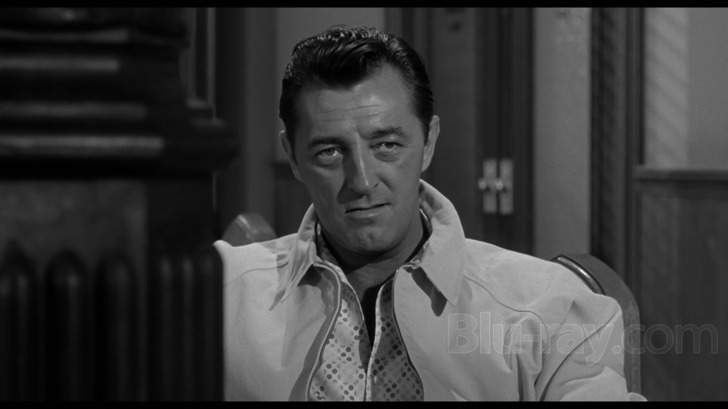
A lot of films (some might even argue most films) posit some sort of version of the eternal “good versus evil” scenario, but more often than not, the so-called white hats and black hats are cartoonish or overly generalized, symbols rather than characters. The ironic thing in Cape Fear is that’s exactly what’s wrong with the Peck character—not in the cartoonish sense, for Peck’s Sam Bowden is a straight arrow father and husband, a walking personification of Truth, Justice and The American Way—but in that kind of bland, generic way that deprives the viewer from peeking beneath the surface. This is not to say in any way that Peck’s character isn’t believable, for under Peck’s very well modulated depiction, Bowden is a relatively full bodied individual. But Bowden simply pales in comparison to the viscerally evil Max Cady (Robert Mitchum). In this regard, Cape Fear is certainly one of the most impeccably memorable films in its depiction of a sort of genetically villainous, but very believable, character.
Cady was sent away to prison eight years prior the film’s beginning, largely on the testimony of Bowden, ironically not as an attorney but as a witness to a vicious assault Cady was perpetrating on a young woman. The clear implication is rape, but 1962 censors simply wouldn’t allow that word to be used, especially since a lot of the rest of the film has Cady stalking Bowden’s attractive wife (Polly Bergen) and young daughter (Lori Martin). We meet Cady, ironically dressed all in white, as he ambles through a Georgia courthouse, almost breaking his neck on several occasions to check out passing women, ultimately drifting into a courtroom where he sees Bowden in action. Bowden doesn’t notice Cady, and in fact doesn’t even initially recognize him even after Cady suddenly shows up at Bowden’s car as he is starting to drive away from the courthouse, yanking Bowden’s keys out of the ignition and beginning what will be a very dangerous cat and mouse game for the rest of the film.
Mitchum’s Cady simply oozes menace, and not just with regard to the Bowden family. In one of the film’s most disturbing sequences, Cady picks up an attractive young woman (Barrie Chase) at a bar and then viciously assaults her. Bowden has been struggling to deal with Cady’s escalating threats (including Cady murdering the family’s dog), but even the local police chief (Martin Balsam) hasn’t been able to find anything to arrest Cady for. The assault seems to be the ticket, but the young woman is so traumatized by her interaction with Cady that she refuses to testify against him. (Chase was the long time dancing partner of one Fred Astaire late in his career.) Mitchum, clutching a cigar and sporting a languorous Southern accent, conveys so much threat in simple movements and even glances that his performance becomes indelibly etched on the mind, making it easy to understand the terror those who come into contact with Cady feel to the core of their being.
Things ratchet up slowly but steadily under J. Lee Thompson’s nuanced direction. Everything Bowden tries, from involving the police to hiring a private detective (Telly Savales) to actually trying to bribe Cady himself to leave him alone, fails, leading to the tense third act of the picture. Bowden takes his family to a houseboat on the titular Cape Fear, hoping that Cady will follow, trespass, and finally give the police a reason to put the madman away. That sets up a really terrific series of showdowns where Mitchum’s hulking physicality and incredibly dangerous persona are allowed to fully shine. It’s a commanding performance, one that is miles ahead of the more over the top but much less effective turn by Robert De Niro in Martin Scorsese’s remake of the original. As that oft-quoted adage goes, sometimes less is more.
Cape Fear Blu-ray Movie, Video Quality 
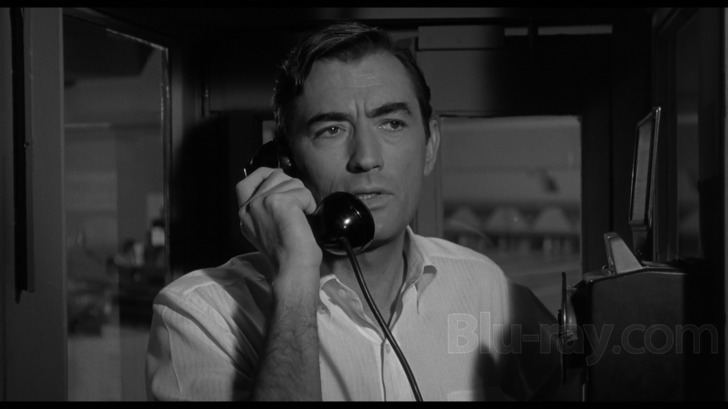
Cape Fear is presented on Blu-ray courtesy of Universal Films with a VC-1 encoded 1080p transfer in 1.85:1. Universal seems to be at least trying to moderate its much maligned use of DNR on its catalog titles, but this film's VC-1 codec may indicate an older high definition transfer that is only now seeing the light of day. While this is nowhere near the most egregious example of Universal's tendency to remove grain, those who dislike even moderate DNR will probably be less than completely pleased with the look of this Blu-ray. There is fine grain obviously apparent in virtually all of the film, and in fact some of the second unit footage boasts rather large amounts of grain, but there's still a slightly scrubbed look here that indicates Universal's penchant for DNR. That said, the overall image here is nicely crisp, with good to very good fine detail and really well modulated gray scale. Blacks are consistent and quite deep and whites bristle nicely without ever blooming. This is probably one of those "glass half full, glass half empty" situations where each individual viewer's sensitivity to even relatively moderate DNR will play a large part in how they respond to this presentation.
Cape Fear Blu-ray Movie, Audio Quality 
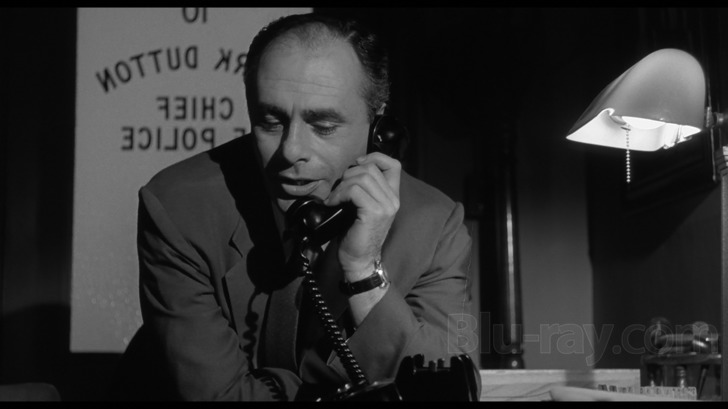
Cape Fear features a lossless DTS-HD Master Audio Mono mix pumped through two channels which offers good reproduction of all dialogue and especially of Bernard Herrmann's brooding score. J. Lee Thompson thought of Cape Fear as a kind of homage to Hitchcock, so along with then-recent Psycho alum Martin Balsam in the cast, Thompson also hired Hitchcock's frequent collaborator Herrmann, who provided a neatly minimalist score that is largely based on a four note brass motive that Herrmann tweaks in inventive ways throughout the film. Fidelity is quite good, though obviously very narrow, with good midrange and just slightly clipped sounding high range at times.
Cape Fear Blu-ray Movie, Special Features and Extras 
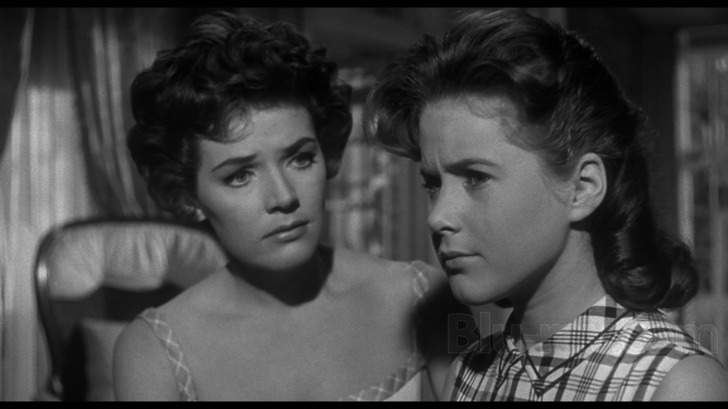
- The Making of Cape Fear (480i; 27:59) is a good retrospective documentary featuring interviews with Gregory Peck and J. Lee Thompson. Many aspects of the film's pre-production and filming are covered, including brief portraits of most of the major players in the film.
- Theatrical Trailer (480i; 2:06)
- Production Photographs (480i; 4:49)
Cape Fear Blu-ray Movie, Overall Score and Recommendation 
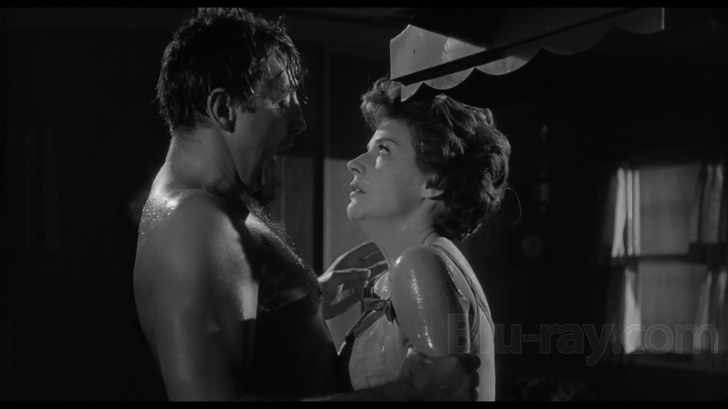
Younger filmmakers seem to think that the more graphic they make their thrillers, the scarier they will automatically be. An older film like Cape Fear proves how wrong that assertion really is. While there's no denying there is some violence in this film, it's handled really rather discursively (in fact about the only outright horror we see is Cady dispatching a bodyguard toward the end of the film). J. Lee Thompson realized the wisdom of implying violence, something aided and abetted by Mitchum's towering performance. Mitchum was a personality who often really didn't get his full due as an actor, despite amazing work in a number of films ranging from the aforementioned The Night of the Hunter to the underrated David Lean epic Ryan's Daughter (a film that is virtually screaming to be released on Blu-ray). But Mitchum's Max Cady may well be the apex of the actor's long and colorful career, and it by itself is worth the price of admission to this viscerally exciting film. The image quality here will probably have its fair share of at least minor detractors, although for a Universal catalog release, it looks pretty decent. Audio quality is just fine and the minimal supplements are enjoyable. Recommended.
Similar titles
Similar titles you might also like

Cape Fear
1991

The Onion Field
1979

Leave Her to Heaven
1945

I Confess
Warner Archive Collection
1953

Nocturnal Animals
2016

Sleuth
1972

The Offence
1973

Stage Fright
Warner Archive Collection
1950

The Killer Is Loose
Special Edition
1956

On Dangerous Ground
Warner Archive Collection
1951

Obsession
Indicator Series | Limited Edition
1949

The Silence of the Lambs
1991

Raw Deal
Reissue | Special Edition
1948

House of Games
1987

The Big Heat 4K
1953

Johnny Handsome
1989

Kiss of Death
Limited Edition to 3000
1947

Hell on Frisco Bay
1955

We Need to Talk About Kevin
2011

Black Widow
Limited Edition to 3000
1987
